#primate cognition
Text
Kanzi the bonobo is now a gamer!
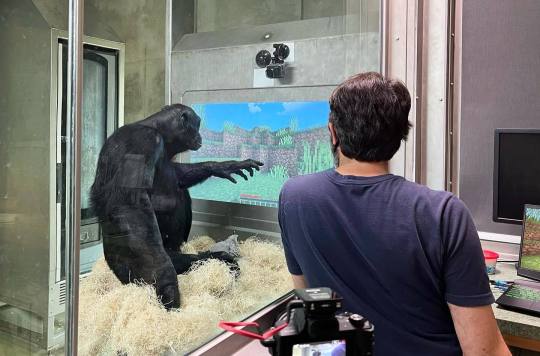
YouTuber ChrisDaCow reached out to the Des Moines’ Ape Cognition and Conservation Initiative where Kanzi and his bonobo family live. For decades Kanzi has demonstrated proficency in learning tasks and understanding human language, and his introduction to Minecraft adds to human study as well as Kanzi's enrichment.
Kanzi started by familiarizing himself with the game, using arrows to point to loot on the ground. Over time, Kanzi learned to tap the center of a touchscreen to move forward and touch the sides to turn and look around.
Kanzi gets rewarded for his achievements with his favorite snacks, such as peanuts, grapes, and apples. Kanzi not only enjoys playing Minecraft but also when people play with him.
Watch the video here! A fundraiser is included to build new outdoor play areas for the bonobos. They have already raised 10 thousand dollars and are planning another video about Kanzi's Minecraft world.
#chrisdacow#kanzi the bonobo#bonobos#apes#great apes#ape research#primates#primate cognition#minecraft#gamer#video games
176 notes
·
View notes
Text
Hey, check this out! Chimpanzees show each other things just to share the experience.

While it is a common human experience to show a friend or family member something you enjoy, this behavior is not ours alone. In a video filmed recently, an adult wild chimpanzee is enjoying a leaf by picking at it with her fingers and mouth and pauses to hold it out in front of her mothers face. She moves to ensure her mother has seen it, and then continues.
From the article describing the research findings:
“She’s not offering it for food. She doesn’t want her mum to do anything. She just wants them to look at it together, and be like ‘Oh, cool, nice!’,” said Prof Katie Slocombe of the University of York, a co-author of the study. Slocombe and colleagues noted that even close relatives of humans, such as great apes, were [previously] thought only to gesture to objects for particular purposes.
“It is not the first time that we have seen a suggestion that chimpanzees voluntarily point out information to others – I myself have described such incidents – or that they may teach others new information, but this is now the best documented case,” he said. "It signifies that chimpanzees, and perhaps also other apes, grasp that other individuals gather information the way they do themselves, and are willing to share information with others without any prompting or rewards or self-serving purposes.”
308 notes
·
View notes
Note
Good luck on your 2nd year of your master's program 💕
Thank you 🩷🩷
Im actually much more excited for thisbyear because they changed the program and since I didn't finish some classes I get to take the newer ones which means no more anthropology of politics and more bioanthropology classes :D
9 notes
·
View notes
Text
#animals#biodiversity#birds#candice gaukel andrews#chimpanzees#cognition#corvids#crows#cultures#dinosaurs#fish#gorillas#humans#natural habitat adventures#nathab#nature#new zealand#robins#primates#science#scientific research#visual perspective taking#whales#wildlife#wolves#world wildlife fund#wwf
0 notes
Text

💚🐌 Climbing snails everywhere? 🤔 Or am I just especially looking for them? Subconsciously priming my brain to see them. Or am I not really seeing them that often, but counting and emphasizing the hits while ignoring the misses? Resulting in a distorted subjective view of reality. Probably a little bit of everything. 🤓 Confirmation bias at its finest. Mindfulness and self-awareness are key to recognizing that. Once recognized, we can actively work against it or at least acknowledge the impact it has on our views. 🖖😊
#snail#nature photography#self awareness#self introspection#my bias#biases#cognitive biases#confirmation bias#mindfulness#self improvement#human nature#human psychology#subconscious#primates#coincidence#coinkidink#gods plan#gods creation#wise words#wisdom#enlightenment#ignorance#philosophy#writeblr#artists on tumblr#poets on tumblr#poets and writers
0 notes
Text
Three AI insights for hard-charging, future-oriented smartypantses
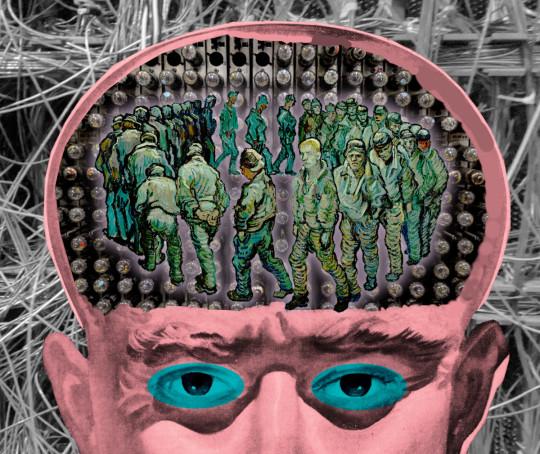
MERE HOURS REMAIN for the Kickstarter for the audiobook for The Bezzle, the sequel to Red Team Blues, narrated by @wilwheaton! You can pre-order the audiobook and ebook, DRM free, as well as the hardcover, signed or unsigned. There’s also bundles with Red Team Blues in ebook, audio or paperback.

Living in the age of AI hype makes demands on all of us to come up with smartypants prognostications about how AI is about to change everything forever, and wow, it's pretty amazing, huh?
AI pitchmen don't make it easy. They like to pile on the cognitive dissonance and demand that we all somehow resolve it. This is a thing cult leaders do, too – tell blatant and obvious lies to their followers. When a cult follower repeats the lie to others, they are demonstrating their loyalty, both to the leader and to themselves.
Over and over, the claims of AI pitchmen turn out to be blatant lies. This has been the case since at least the age of the Mechanical Turk, the 18th chess-playing automaton that was actually just a chess player crammed into the base of an elaborate puppet that was exhibited as an autonomous, intelligent robot.
The most prominent Mechanical Turk huckster is Elon Musk, who habitually, blatantly and repeatedly lies about AI. He's been promising "full self driving" Telsas in "one to two years" for more than a decade. Periodically, he'll "demonstrate" a car that's in full-self driving mode – which then turns out to be canned, recorded demo:
https://www.reuters.com/technology/tesla-video-promoting-self-driving-was-staged-engineer-testifies-2023-01-17/
Musk even trotted an autonomous, humanoid robot on-stage at an investor presentation, failing to mention that this mechanical marvel was just a person in a robot suit:
https://www.siliconrepublic.com/machines/elon-musk-tesla-robot-optimus-ai
Now, Musk has announced that his junk-science neural interface company, Neuralink, has made the leap to implanting neural interface chips in a human brain. As Joan Westenberg writes, the press have repeated this claim as presumptively true, despite its wild implausibility:
https://joanwestenberg.com/blog/elon-musk-lies
Neuralink, after all, is a company notorious for mutilating primates in pursuit of showy, meaningless demos:
https://www.wired.com/story/elon-musk-pcrm-neuralink-monkey-deaths/
I'm perfectly willing to believe that Musk would risk someone else's life to help him with this nonsense, because he doesn't see other people as real and deserving of compassion or empathy. But he's also profoundly lazy and is accustomed to a world that unquestioningly swallows his most outlandish pronouncements, so Occam's Razor dictates that the most likely explanation here is that he just made it up.
The odds that there's a human being beta-testing Musk's neural interface with the only brain they will ever have aren't zero. But I give it the same odds as the Raelians' claim to have cloned a human being:
https://edition.cnn.com/2003/ALLPOLITICS/01/03/cf.opinion.rael/
The human-in-a-robot-suit gambit is everywhere in AI hype. Cruise, GM's disgraced "robot taxi" company, had 1.5 remote operators for every one of the cars on the road. They used AI to replace a single, low-waged driver with 1.5 high-waged, specialized technicians. Truly, it was a marvel.
Globalization is key to maintaining the guy-in-a-robot-suit phenomenon. Globalization gives AI pitchmen access to millions of low-waged workers who can pretend to be software programs, allowing us to pretend to have transcended the capitalism's exploitation trap. This is also a very old pattern – just a couple decades after the Mechanical Turk toured Europe, Thomas Jefferson returned from the continent with the dumbwaiter. Jefferson refined and installed these marvels, announcing to his dinner guests that they allowed him to replace his "servants" (that is, his slaves). Dumbwaiters don't replace slaves, of course – they just keep them out of sight:
https://www.stuartmcmillen.com/blog/behind-the-dumbwaiter/
So much AI turns out to be low-waged people in a call center in the Global South pretending to be robots that Indian techies have a joke about it: "AI stands for 'absent Indian'":
https://pluralistic.net/2024/01/29/pay-no-attention/#to-the-little-man-behind-the-curtain
A reader wrote to me this week. They're a multi-decade veteran of Amazon who had a fascinating tale about the launch of Amazon Go, the "fully automated" Amazon retail outlets that let you wander around, pick up goods and walk out again, while AI-enabled cameras totted up the goods in your basket and charged your card for them.
According to this reader, the AI cameras didn't work any better than Tesla's full-self driving mode, and had to be backstopped by a minimum of three camera operators in an Indian call center, "so that there could be a quorum system for deciding on a customer's activity – three autopilots good, two autopilots bad."
Amazon got a ton of press from the launch of the Amazon Go stores. A lot of it was very favorable, of course: Mister Market is insatiably horny for firing human beings and replacing them with robots, so any announcement that you've got a human-replacing robot is a surefire way to make Line Go Up. But there was also plenty of critical press about this – pieces that took Amazon to task for replacing human beings with robots.
What was missing from the criticism? Articles that said that Amazon was probably lying about its robots, that it had replaced low-waged clerks in the USA with even-lower-waged camera-jockeys in India.
Which is a shame, because that criticism would have hit Amazon where it hurts, right there in the ole Line Go Up. Amazon's stock price boost off the back of the Amazon Go announcements represented the market's bet that Amazon would evert out of cyberspace and fill all of our physical retail corridors with monopolistic robot stores, moated with IP that prevented other retailers from similarly slashing their wage bills. That unbridgeable moat would guarantee Amazon generations of monopoly rents, which it would share with any shareholders who piled into the stock at that moment.
See the difference? Criticize Amazon for its devastatingly effective automation and you help Amazon sell stock to suckers, which makes Amazon executives richer. Criticize Amazon for lying about its automation, and you clobber the personal net worth of the executives who spun up this lie, because their portfolios are full of Amazon stock:
https://sts-news.medium.com/youre-doing-it-wrong-notes-on-criticism-and-technology-hype-18b08b4307e5
Amazon Go didn't go. The hundreds of Amazon Go stores we were promised never materialized. There's an embarrassing rump of 25 of these things still around, which will doubtless be quietly shuttered in the years to come. But Amazon Go wasn't a failure. It allowed its architects to pocket massive capital gains on the way to building generational wealth and establishing a new permanent aristocracy of habitual bullshitters dressed up as high-tech wizards.
"Wizard" is the right word for it. The high-tech sector pretends to be science fiction, but it's usually fantasy. For a generation, America's largest tech firms peddled the dream of imminently establishing colonies on distant worlds or even traveling to other solar systems, something that is still so far in our future that it might well never come to pass:
https://pluralistic.net/2024/01/09/astrobezzle/#send-robots-instead
During the Space Age, we got the same kind of performative bullshit. On The Well David Gans mentioned hearing a promo on SiriusXM for a radio show with "the first AI co-host." To this, Craig L Maudlin replied, "Reminds me of fins on automobiles."
Yup, that's exactly it. An AI radio co-host is to artificial intelligence as a Cadillac Eldorado Biaritz tail-fin is to interstellar rocketry.


Back the Kickstarter for the audiobook of The Bezzle here!

If you’d like an essay-formatted version of this post to read or share, here’s a link to it on pluralistic.net, my surveillance-free, ad-free, tracker-free blog:
https://pluralistic.net/2024/01/31/neural-interface-beta-tester/#tailfins
#pluralistic#elon musk#neuralink#potemkin ai#neural interface beta-tester#full self driving#mechanical turks#ai#amazon#amazon go#clm#joan westenberg
1K notes
·
View notes
Text
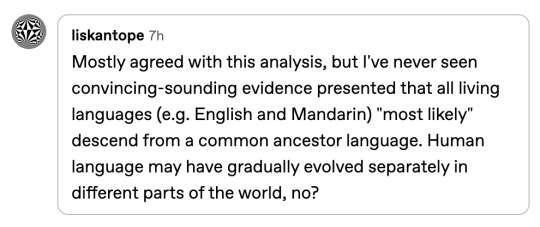
This is an area of active debate, and also evolution of language is not my field, so I'm not especially qualified to speak on it. The position that language evolved separately in different areas of the world (polygenesis of language) is held by various people, so indeed it "may have" occurred that way. By in my estimation it's not particularly likely.
Humans have a lot of specialized adaptations for speaking. Our vocal tracts allow us to produce a wide range of consonant sounds, for which we are unique among mammals. The range of our hearing also appears tuned to pick up these consonant sounds. We also very probably have cognitive adaptations specifically for speech production (as opposed to just general intelligence), although their nature is perhaps less agreed upon. All in all we are biologically adapted for speech, and there is some evidence that earlier human subspecies like Neanderthals were too.
In light of this, I think it is almost certain that language predates human anatomical modernity, perhaps by a very great degree (recall also that things like relatively complex tool making predate modern humans by several million years). Thus: language predates the migration out of Africa, it predates various population bottlenecks that modern humans were subjected to, etc. etc. Most importantly, I think it is extraordinarily unlikely that language is something we "invented" one day. I strongly suspect the modern human linguistic capacity evolved slowly out of earlier, simpler communication systems used by our primate ancestors—communication systems which had some cultural variation, as modern chimpanzees show today, but orders of magnitude less than what humans have. And, in the limit, these systems evolved from even simpler ones with no cultural variation at all.
This makes monogenesis trivially true if go far back enough. Under this hypothesis we can say that modern human linguistic variation might conceivably date to pre-human cultural variation in our ancestors' simpler, pre-linguistic communication systems. If this is the case, human-language-as-such still would have been subject to either strong mutual areal influence at various points in history or to some kind of convergence of features due to the constraints of modern human linguistic cognition specifically, because all modern languages are "pretty similar".
This is all not to mention creolization, which depending on how you want to frame it, adds disjoint nodes or cycles to the tree of linguistic descent.
137 notes
·
View notes
Text
Watched a lot of videos on non-human primate pet trade abuses, and I started thinking of the horror that the Flower Fruit Mountain monkeys went through.
By-standers in a war against Heaven.
From mathing it out; atleast 23500 of their numbers died in the Burning after Sun Wukong was captured for the Furnace.
Their King was missing for 500 years. How long did it take before the outside world discovered their paradise and began ravaging it?

Apparently only two years after the Fires died down.
About half of those 23500 left the island for greener pastures (who would blame them?), leaving 11750 of SWK's subjects alone to defend themselves against the Hunters.
By the time of SWK's return during the White Bone Spirit arc; only 1000 of his people remain. Most being eaten. How many of those hunters looked a pleading yaoguai, almost human-looking, in the eye and decide to kill and eat them?
And it's canonical that many were stolen to be pets/performing animals. Fully intelligent and sapient monkey demons treated as circus animals or an oddity to be added to some noble's menagerie.
There were definitely survivors and those who were rescued, as evident by the monkey that tells this to Wukong when he arrives aghast at the state of his kingdom.
Did the Monkey King ever come across one of his people in his travels? Forced to preform for gold and food, or reduced to a domesticated lapdog? Did he rage? Was he allowed seek revenge for his people?
How would a chapter go where upon meeting a King or Emperor seeking help, the Pilgrims witness a monkey yao; chained, shaven, and dressed like a baby, at the foot of the throne? Or ones forced to become servants in the halls of kings who saw them as "cheaper" than their human counterparts? Multiple kingdoms in the Journey have outright human slaves - imagine the cognitive dissonance that would occur in a kingdom where demon life was "less than human", therefore it was ok in their minds for them to be enslaved.
The Camel Ridge Kingdom had good intentions ultimately. They were only doing what humans had been doing to them this whole time.
#journey the west#jttw#jttw theories#sun wukong#cannibalism tw#pretty dark topic but I am intrigued by the idea of the lines getting blurred between human demons and animals
74 notes
·
View notes
Text
HUMAN // THEORIES
Humans, or modern humans (Homo sapiens or H. sapiens), are the most common and widespread species of primate, and the only surviving species of the genus Homo. A great ape characterized by their hairlessness, bipedalism, and high intelligence, humans have large brains, enabling more advanced cognitive skills that enable them to thrive and adapt in varied environments, develop highly complex tools, and form complex social structures and civilizations.
I. SPECIES OF PRIMATE – in terms of biology, we fall under the classification of animals. we share more similarities with fellow species under this classification opposed to less similarities. study the behavior of fellow animals, limitlessly, and focus your attention on that of their primitive states-of-being. apply these tactics to our advanced state of multi-faceted intellect, and learn from them.
II. HIGH INTELLIGENCE – a privilege amongst humankind that, to an exponential degree, fails to be utilized by the masses. success in relation to survival is largely attributed to this level of intelligence on a day-to-day basis. with the exception of cases linear with cognitive neurodiversity—excuses against the enrichment and manifestation of this attribute remain impotent. failure to both utilize and acknowledge this predisposition will only lead to mortal sterility.
Humans are highly social, with individual humans tending to belong to a multi-layered network of cooperating, distinct, or even competing social groups—from families and peer groups to corporations and political states. As such, social interactions between humans have established a wide variety of values, social norms, languages, and traditions (collectively termed institutions), each of which bolsters human society.
III. HIGHLY SOCIAL – as if an art form opposed to a science, one must not only enforce to find a comfortable balance regarding this subject, but also attune themselves into the identification of natural compatibility, emotional maturity, and self-interest of individuals they encounter. if one chooses to form a social attachment with a subject who’s imbalanced in any aforementioned concepts, a state of emotional/energetic hemorrhage may occur. ideally, one must invest the majority of their energy into those in which form a unified duality of mutual restoration with oneself; opposed to the inclination of self-sacrifice, fueled by a multitude of various factors. one must vigilantly prioritize themselves as to not grow tarnished in an act of preservation for not only themselves—but for the consistent nourishment of their otherwise deep-rooted connections in which an active catalyst has been established. avoid social martyrdom.
Humans are also highly curious: the desire to understand and influence phenomena has motivated humanity's development of science, technology, philosophy, mythology, religion, and other frameworks of knowledge; humans also study themselves through such domains as anthropology, social science, history, psychology, and medicine.
IV. HIGHLY CURIOUS – passions, as sacred as they can be bewildering, [sub]consciously occupy the largest percentage of our time. to be mystified by that of which is misunderstood may be one of life’s most-precious offerings. our pursuits in creativity reward us with a key which unlocks subliminal facets within our psyche, only to be comprehended at a later point in time. these lay the foundations at our primal core, and, as a divine mission which one chooses to either ignore or commence upon, choosing the latter inevitably trails the path toward self-actualization. a probable reason why we exist—without the ability to reference some comprehensive manual—is to polarize us toward what we will produce as an earth-bound monolith to perpetually inspire future generations of those impassioned by the very same mystical essence that once lay dormant within ourselves.
As of January 2024, there are more than 8 billion humans alive.
you uniquely represent 1 amongst eight billion.
radiate your inner light for those blind to the dark.
43 notes
·
View notes
Text
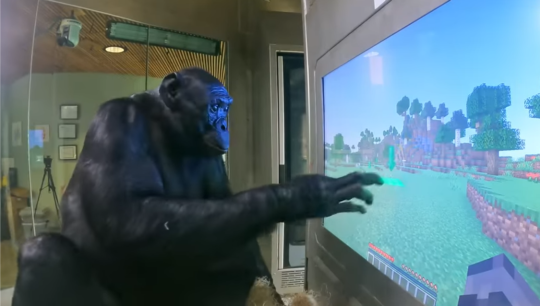

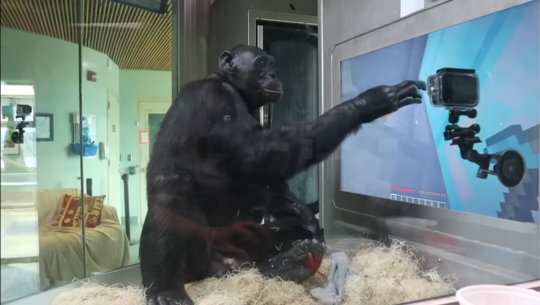

Kanzi the bonobo playing Minecraft
86 notes
·
View notes
Note
What do monkeys think of us and/or other monkey species? Do they recognize us as a different species, or do they consider those close to them (reserve caretaker and similar) to be part of their community? I heard cats see us as fellow adult cats so now I'm wondering about other animals.
While we can't definitely tell what other primates are thinking, it appears that many of them recognize us as being like them. They appear to recognize that humans are not the same species as them, but depending on their relationships with others of their species and humans may consider themselves to have more or less in common with us. For example, chimpanzees raised as pets essentially grow up believing that they are related to humans. The chimp may recognize that they do not have everything in common with the humans around them, but if they are raised only having relationships with humans they will consider their community to be made up of people. Similarly, wild and acclimated primates would not consider humans to be as close to them.
This is largely speculative, but the differences between species are largely socially perceived when it comes to inter-animal relations and that's about as much as I can say without overreaching too broadly.
96 notes
·
View notes
Note
HI!! I WAS WONDERING IF YOU HAD ANY COOL CROW FACTS AND I WOULD ALSO LIKE TO SAY THAT YOU ARE PURPLE PERSONIFIED AND VERY VERY COOL! :D
Crows are fascinating birds & they are actually very smart & they don't deserve the bad reputation they have.
Alright, here are some facts:
When a crow dies, its neighbours may have a funeral.
Older crow siblings help the parents co-parent their smaller siblings.
Crows have regional dialects, just like humans.
They are also able to read traffic lights.
Beware, crows are good at facial recognition & thus can hold a grudge. ;)
Crows understand impulse control (unlike Nardo)
But also:
Crows, ravens & parrots have the biggest brain-to-body size ratios of all living bird species.
They’ve shown levels of cognition that put them on par with the great apes. In lab tests, they have shown a much higher density of neurons in their forebrains than primates do.
The number of neurons in this region is thought to correlate with a given animal’s intelligence.
Theoretically, having more neurons translates to better cognitive reasoning.
A 2020 study looked at whether crows, like humans & great apes, can demonstrate consciousness.
Crow brains lack a cerebral cortex, where most of the primate brain’s conscious perception happens. Researchers tracked the brain activity in two crows as they performed different tasks & discovered that they could perceive sensory input, suggesting that there is much more to understand about the evolution of consciousness.
I hope you're satisfied! /g

Thank you for the compliment ~
#donnie answers#donnies exceptional mind#turtle net#rottmnt#crows#animal facts#i love to infodump#biology infodump#donatello infodumps#facts#crow facts
31 notes
·
View notes
Photo

Profiles in Villainy
Mojo Jojo
Are you familiar with the tragedy of Jojo the smart?
He had once been a regular monkey who acted as the companion and laboratory assistant to the brilliant Professor Utonium. The professor was desperate to be a father and endeavored on a daring experiment to create the perfect little girls. Throwing himself into his work, the professor neglected Jojo, leaving the sensitive primate bitter and anxious. In a fit of anger, Jojo pushed the professor knocking over a vial of the strange and dangerous ‘chemical X.’ This resulted in a terrific explosion that not only created The Powerpuff Girls but also drastically altered Jojo.
The mutagenic properties of Chemical X caused the monkey’s skin to turn green and his brain grow several times in size, bestowing him an unparalleled intellect. Jojo tried to win the professor’s attention with his newfound cognitive gifts, yet the professor was too busy with his new daughters to pay him any mind. Jojo's pain, his jealousy and resentment grew into a blinding rage. He ran away and rededicated himself to using his genius to destroy Townsville and conquer the world.
Now known as Mojo Jojo, the monkey embarked on a campaign of sinister and ingenious machination so to achieve his goals of domination. And time and again the Powerpuff Girls have been there to stop him. It has made for a cruel irony that these same rivals for the professor's attention would also become Jojo’s most persistent and vexing of arch nemeses.
And yet the monkey persisted and was ultimately victorious. Mojo Jojo succeeded in finally conquering the world. Rather than ruling the planet with an iron fist as he always imagined he would, the monkey instead solved many of world's problems and proved himself a most capable and benevolent of leaders.
Alas this did little to quell the deeply seated feelings of pain and unmet need he had within him. Ultimately, Mojo Jojo became bored with the peace he had achieved and reverted to his evil ways. The world resumed to its former status quo and Jojo returned his role as a villain whose diabolical schemes were regularly thwarted by the Powerpuff Girls.
Whether or not this simian Sisyphus will ever attain that which has remained out of his longing grasp remains yet to be told…
Actor Roger L. Jackson provides the voice for Mojo Jojo; with the villain first appearing in the debut episode of The Powerpuff Girls, airing on November 18th, 1998.
114 notes
·
View notes
Text
Interesting Reviews for Week 7, 2024
Reap while you sleep: Consolidation of memories differs by how they were sown. Antony, J. W., & Schechtman, E. (2023). Hippocampus, 33(8), 922–935.
Brain energetics and the connectionist concept in cognitive neuroscience. Arshavsky, Y. I. (2023). Journal of Neurophysiology, 130(1), 61–68.
Assessments of dentate gyrus function: discoveries and debates. Borzello, M., Ramirez, S., Treves, A., Lee, I., Scharfman, H., Stark, C., … Rangel, L. M. (2023). Nature Reviews Neuroscience, 24(8), 502–517.
Specialized Networks for Social Cognition in the Primate Brain. Deen, B., Schwiedrzik, C. M., Sliwa, J., & Freiwald, W. A. (2023). Annual Review of Neuroscience, 46(1), 381–401.
#neuroscience#science#research#brain science#scientific publications#cognitive science#reviews#neurobiology#cognition#psychophysics#computational neuroscience
12 notes
·
View notes
Text

This Napoleon is doing some hard thinking!
A lot of people don’t know this, but Napoleons have some remarkable problem-solving and cognitive abilities. They have been found to have an advanced level of cognitive power, above that of even a four-year-old human child. They can understand cause and effect, and use tools to solve problems, such as using a stick to obtain food from a hard-to-reach place, or using artillery to decimate infantry to make way for cavalry. They can even comprehend and use arithmetic, counting well above the number eight.
Studies have found that Napoleons have proportionaly similar sized brains as many primates, which is thought to be the reason for their advanced intelligence.
But their intelligence doesn't stop there, Napoleons have been found to be able to understand, use and combine concepts such as same and different, big and small, and different colors and shapes. They are able to understand the concept of zero and use it to solve problems, demonstrating a level of cognitive sophistication.
Pretty cute, if you ask me!
29 notes
·
View notes
Text
dunno if anyone here has seen the paper that claims that T. rex had baboon levels of cognition but i would advise caution in believing it wholeheartedly as of now. it seems to pass over a few key areas such as brain size and shape, so even if it’s true that T. rex had primate amounts of neurons they likely would have worked very differently.
the paper mentions that they took neuron amounts from some of the smartest modern birds (crows/parrots) to try and extrapolate to T. rex. i personally think that doesn’t make much sense as 1) even tho T. rex is relatively closely related to modern birds it was not a member of the group that are the direct ancestors of birds. 2) not only are parrots and crows very smart animals, they also *fly*, which from my layman’s perspective, would require a substantial amount of neurons to be good at flying without crashing. T. rex did not fly, T. rex smelled and chomped very good, which you don’t need to be a genius to figure out how to do well (if you’re a T. rex) 3) The author of the paper states that the amount of neurons in T. rex showed it could live up to 40 years and with primate intelligence would’ve been able to build tools and culture. Now it is possible for animals to develop culture, various primates and birds have been shown to pass down knowledge to offspring, those animals live in large social groups. as far as i am currently aware T. rex did not, potential exceptions being chick rearing and possible gang hunting where the spoils were fought over afterwards.
to cap this off, i think it’s a cool thing to study! tool use in tyrannosaurs?? that’s NUTS! it would be absolutely wicked if it came to be true! and i think that studying the neurological and cognitive potential of dinosaurs is important, just like any study of ancient biological processes ( in fact i found out just TODAY that paleoneurology exists as a field), but i think it’s good to take in whatever the latest crazy paleo news is with a pinch of salt. have a nice day :-)
i’m including the link to the paper and to the first tweet of Thomas Holtz Jr on the subject
https://onlinelibrary.wiley.com/doi/epdf/10.1002/cne.25453

96 notes
·
View notes